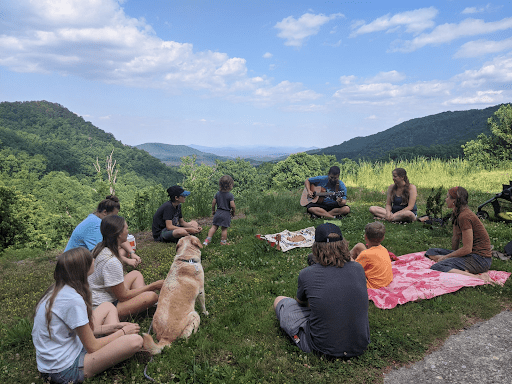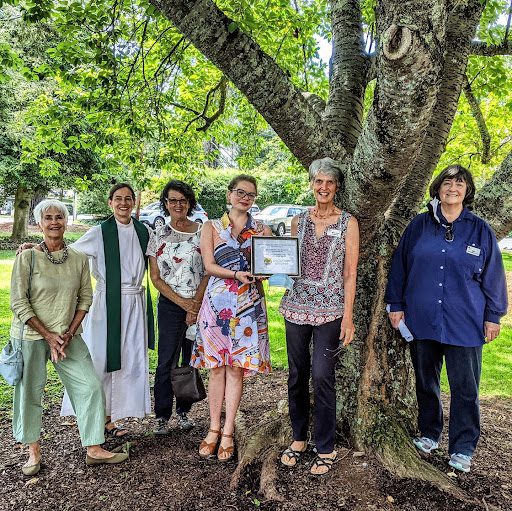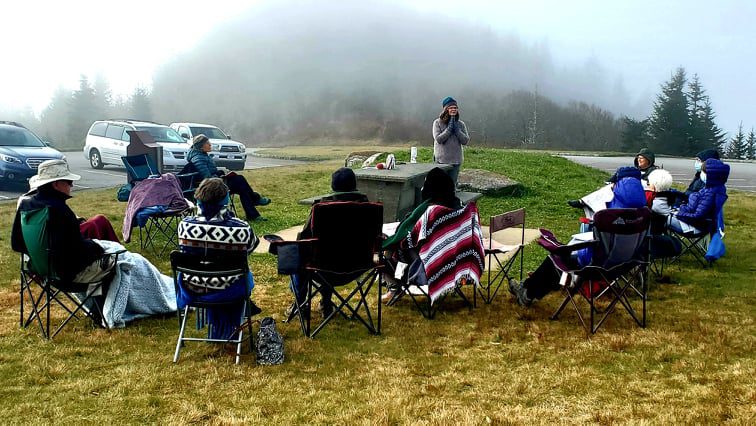Surrounded by the natural beauty of the Appalachian Mountains, the congregations of Western North Carolina are constantly reminded of the necessity to preserve and protect creation or risk losing the stunning landscape. As the world’s climate challenges have become more apparent and the future of our natural environment more tenuous, the Creation Care Alliance of Western North Carolina seeks to help congregations mitigate and adapt to the changes in our world.
Creation Care Alliance of Western North Carolina
The Creation Care Alliance of Western North Carolina (CCAWNC) is “a network of people of faith and congregations who have united around a moral and spiritual call to preserve the integrity, beauty and health of God’s creation” (from the CCAWNC website). It is the faith wing of the organization Mountain True.
“We are concerned about the moment we’re in and the future for other generations, as well as people who are suffering today as a result of ecological damage, our neighbors who are being harmed,” Sarah Ogletree, Director of the Creation Care Alliance, said. “And we are concerned about the damage to our relationship to God through the destruction of what’s sacred.”
Ogletree became the director of the Creation Care Alliance in 2021 but has been affiliated with the alliance since 2014.
“Western North Carolina is a beautiful place with a stunning landscape—it’s really easy to feel God being in this space,” Ogletree shared. “I had a good church experience of finding God in the sanctuary, but the most reliable God connection for me was always on a mountain or in my backyard. The desecration of this beauty harms my relationship with God and impedes other people’s ability to connect with the divine.”

Biblical Roots for Our Contemporary Responsibility
Ogletree pointed to several foundational Scriptures that she feels are clear callings by God to take care of the earth. “Genesis 2:15—’The Lord God took the man and put him in the Garden of Eden to work it and take care of it.’—has been an important verse,” Ogletree said. “Ellen Davis refers to this as our first human job description.” She shared that the original Hebrew words “Till and keep” can also be translated “serve and protect,” which make our call even more clear when translated those ways.
“In Matthew 22:37-39, Jesus calls us to love the Lord and love the neighbor. In the beginning, God created the world and called it good. When we are caring for this world, we are honoring God’s knowledge and love for this world,” said Ogletree. “We can’t love our neighbor without loving the ground and water they drink and air they breathe.”
The poor, the marginalized, the oppressed, the widow, the orphan, the hungry and thirsty—all of the people Jesus served and loved and called us to serve and to love—are impacted by climate disasters, Ogletree shared. These disasters all impede our ability to care for refugees, the hungry, and the poor, to participate in the work that Jesus called his disciples to in Matthew 25:31-46.
“In our climate impacted world, we work both to mitigate impacts of climate change as well as become resilient to what is already happening,” Ogletree said. “We have to be addressing climate change in order to love Jesus in this time.”
Guide to Creation Care
As an alliance, CCAWNC connects congregations across denominations to support one another in the work of creation care. Through online studies, book clubs, eco-grief groups, wild eucharists, in-person workshops, and more, the Creation Care Alliance meets congregations where they are on their journey to be more sustainable.
To help individuals and congregations take their next steps, the CCAWNC developed a Guide to Creation Care, an evolving document that incorporates first steps and best practices to care for all aspects of creation. The Guide is a kind of “choose your own adventure” roadmap to help congregations begin this work, or to encourage congregations to take more significant steps in their congregations.
The Guide provides ways to incorporate creation care across the spectrum of church involvement. It covers sustainable practices, worship and spirituality, education, building and grounds, fellowship and outreach, and advocacy and voting.
The CCA recognizes just how big and overwhelming creation care is for congregations to take on. They also provide a discernment guide to help congregations discern their gifting and calling so they can find greater clarity and focus for their particular work. Ogletree pointed to a quote from Frederick Buechner, “The place God calls you to is the place where your deep gladness and the world’s deep hunger meet.”
“We want to help people recognize that you don’t have to do everything and the best thing we can do is find our joy and find our place,” Ogletree shared. “That’s where we will make the most difference. We’re doing the thing that fills our spirits.”

Hands-On Creation Care Support and Celebration
The CCA offers many opportunities to connect with creation, expand your creation care efforts, and move forward in the good work of mitigation and adaptation. Individuals interested in exploring their particular calling surrounding creation care are invited to apply for a summer internship, which can be completed virtually.
The organization offers virtual and in-person eco-grief groups, which help individuals process through the stages of grief surrounding the future of our environment, the extinction crisis, and other losses we experience as a result of climate change, offering individuals space for lament and a pathway of hope.
“People of faith are a voice of hope, but faith communities can offer lament and rituals of lament to help us grapple with grief,” Ogletree shared. “If we don’t grieve, we numb out. It makes it difficult for us to love well or offer joy. If we numb out one emotion, then our spirit numbs out across all emotions.” The 7-week curriculum leads people from all walks of life together through material that validates their feelings and helps people integrate their emotions with their work. Eco-grief circles are available online and in-person, and training is also available for pastors and counselors who are interested in incorporating this curriculum.
Nothing inspires love for creation and advocacy for creation like experiences within creation. The CCA partners with one of their congregations, Way in the Wilderness, to offer a Wild Eucharist. From the CCA website, “a Wild Eucharist is the celebration of the Holy Communion outdoors amidst the creation, and it requires us to trust the ordinary things of creation, like grapes, water, soil, and grain, to convey the holy. By immersing ourselves in the wild spaces of creation, through the practices of the Eucharist, wandering, and listening, creation reminds us that we are all beloved of God.”
Individuals spend time hiking together, getting to know one another, checking on each other’s souls, and being filled by the beauty of the surrounding wilderness. The event “Brings the mystery [of Eucharist] more to light and opens us up to new mysteries in the beauty of the world practicing this ritual,” Ogletree said.
In order to keep moving forward, CCA believes that our communities need both mitigation practices, like solar panels and stream bank restoration, practices that can serve to slow or reverse climate change, as well as practices that help us to be resilient. “Both strategies help us weather the storms and make the future more beautiful and livable,” said Ogletree.
Learn more about the Creation Care Alliance of Western North Carolina.





 Copyright
2024
Root and Vine
Copyright
2024
Root and Vine